Vegeta’s Pride Makes Him Attractive?!
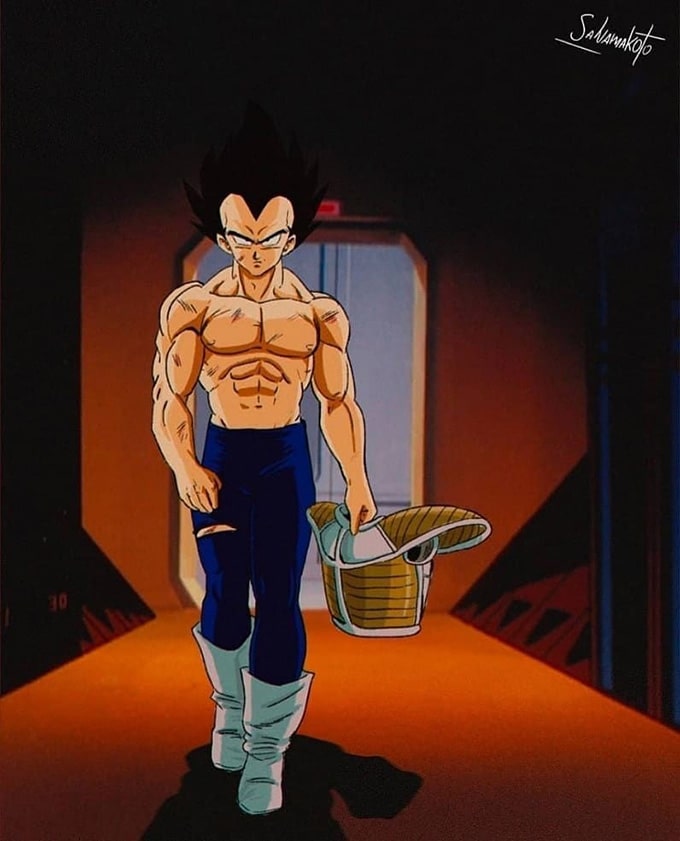
Why is Vegeta attractive to Dragon Ball fans? A scientific study on sexual attractiveness suggests that it’s his pride.
Do you like Goku or Vegeta more? I ask fans this question at pop culture conventions when I sign my book about Goku and Vegeta’s colliding worldviews.
About 95% of women say they like Vegeta more than Goku.
They often explain that Vegeta was their first crush when watching Dragon Ball Z as a teenager. They were attracted to his bad boy attitude and hot body. As the fans grew older and matured, so did Vegeta—becoming a family man—and this strengthened his hold on them.
Or simply because, ‘Goku is stupid. Vegeta has a brain.’
As you’ll see, the science shows us that Vegeta’s brain is sexy.
Of course, not all women love proud men. Pride is one of the 7 deadly sins for a reason, and sometimes it negatively effects Vegeta’s life. And there are people who prefer Goku because he is kind-hearted, defends others, and has other admirable qualities on top of a stellar physique. But those are topics for another day.
In this article we’ll explore Vegeta’s pride and personality, the results of scientific studies on bad boys, and the clash between Western and Eastern cultural perspectives on attractiveness.
You’ll also hear from Dragon Ball fans who explain why they find Vegeta so attractive, to the point of falling in love with him.
Vegeta’s Pride
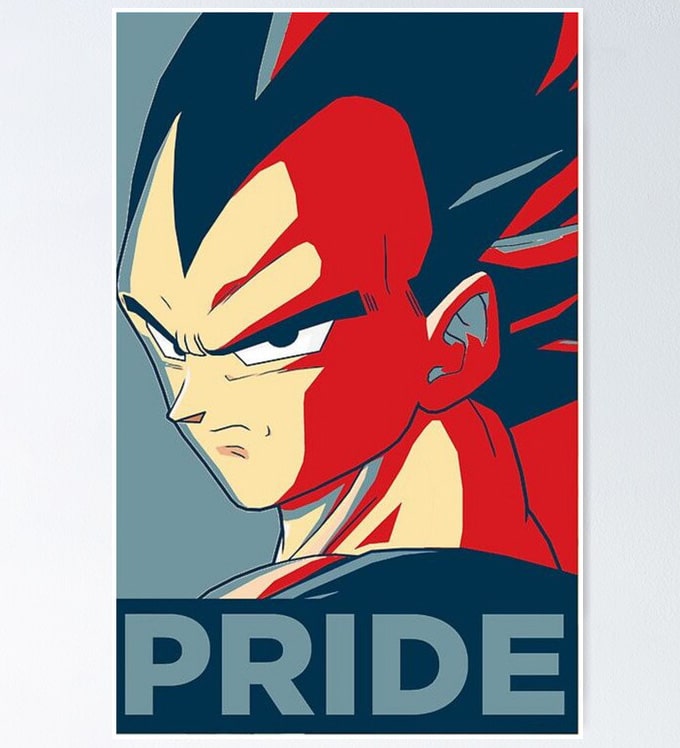
According to a 2011 study titled “Happy Guys Finish Last,” published in the journal Emotion, a majority of women are most attracted to men who show pride, and least attracted to men who smile.
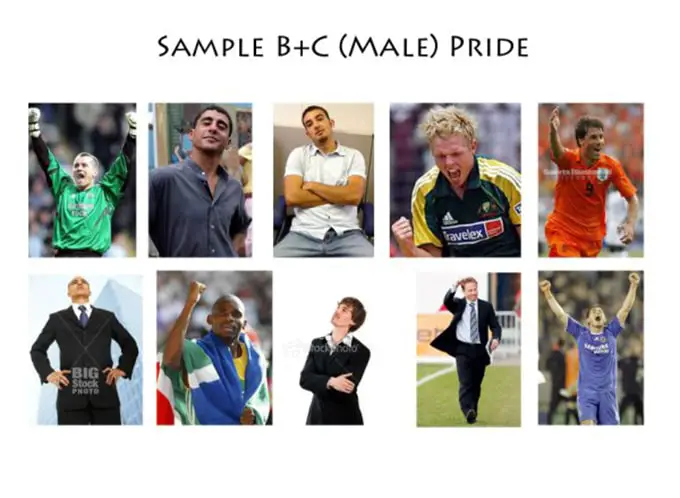
Sample images of men showing pride used in study
The University of British Columbia summarizes the study thusly: “In a series of studies, more than 1,000 adult participants rated the sexual attractiveness of hundreds of images of the opposite sex engaged in universal displays of happiness (broad smiles), pride (raised heads, puffed-up chests), and shame (lowered heads, averted eyes). The study found that women were least attracted to smiling and happy men, preferring those who looked proud and powerful or moody and ashamed.”
Conversely, the study showed that men felt the opposite way toward women, preferring those who appear happy and smile.
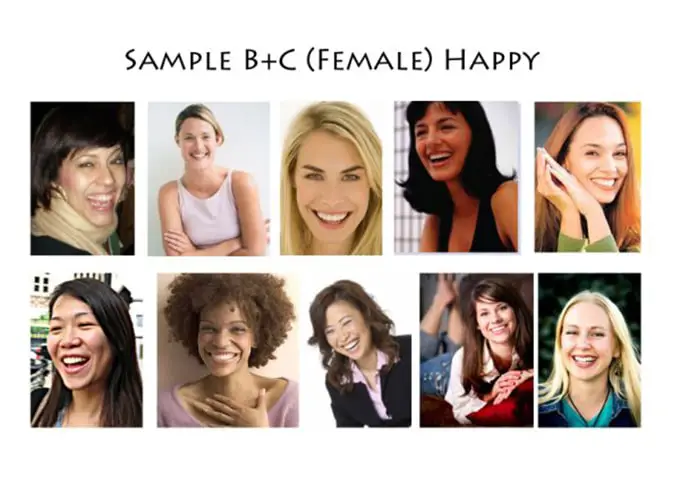
Sample images of women showing happiness and smiling used in study
Women like pride, and Vegeta fits the study’s description of what women find attractive. He rarely smiles, often stands in proud and powerful positions, and repeatedly speaks about his pride, the power of his Saiyan people, and how he is the proud “Prince of all Saiyans!”
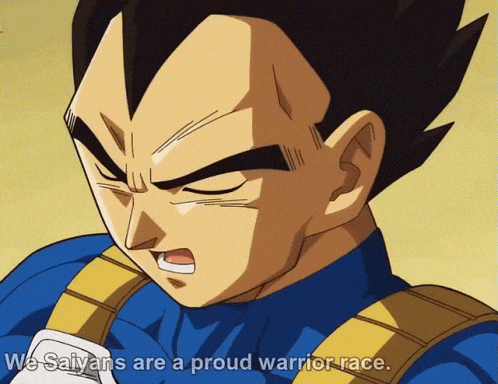
Vegeta is the living embodiment of pride. His pride is the foundation of his personality, his backstory, and the primary source of his motivation. Pride distinguishes Vegeta from Goku in their encounters, and pride shows us the contrast between their worldviews as they fight against one another and become rivals.
Later in the Majin Buu Arc of Dragon Ball Z, after Vegeta settles on Earth, becomes comfortable, and has a son, he returns to pride as his source of strength. When Babidi tries to possess Vegeta with his dark magic, Vegeta resists and shouts at him, “You may have taken over my mind and my body, but there’s one thing a Saiyan always keeps. His PRIDE!!”
And in Dragon Ball Super, Vegeta uses his pride to defeat a squad of Pride Troopers and teaches a Saiyan from another universe how to find his own pride and ascend to higher levels.
Vegeta’s focus on pride isn’t happenstance. It turns out that it was deliberate.
Vegeta Appeals to Girls
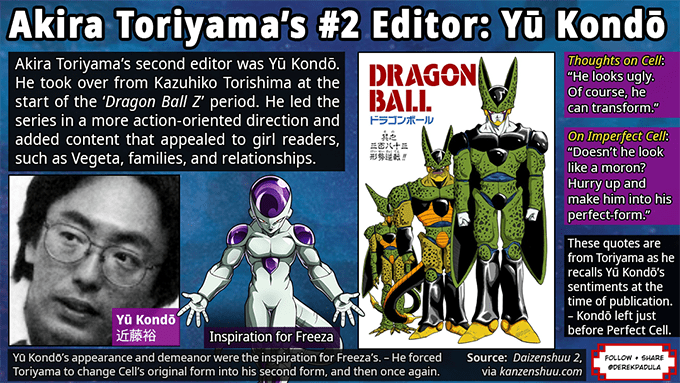
Vegeta was added to Dragon Ball in order to appeal to girls and to enhance the story. He was introduced at the start of the Dragon Ball Z period of the story, after the 23rd Tenkaichi Budōkai, at the behest of Akira Toriyama’s second editor, Yū Kondō.
In a conversation with Toriyama’s three editors of Dragon Ball that appears in the guide book Daizenshū 2: Story Guide (1995), Yū Kondō says that Vegeta appeared, “… because before I came to Jump, I worked at a shōjo manga magazine. After I became editor, we decided what direction things should advance in.”
Kondō-san chose to make Dragon Ball a more story-driven series because that’s the type of manga he knew girls would prefer to read. This decision was based on his experiences as an editor of shōjo (young girls) manga prior to coming to Shueisha and Weekly Shōnen Jump, where Dragon Ball was published.
He added content that appealed to girl readers, such as Vegeta, families, and relationships.
This coincides with the point where Goku married Chichi and had his first son, Gohan, which came as a surprise to Goku’s friends and the readers. Likewise the revelation of Goku’s true heritage as a Saiyan descended from the low-level warrior Bardock. These family elements are still at the heart of the story, and are what draw many fans into the series.
Akira Toriyama’s first editor, Kazuhiko Torishima said in Daizenshū 2, “Goku grew up, and then during Kondō-san’s time, Vegeta appeared and the number of female fans increased. (laughs)”
The success of this deliberate attempt to appeal to female readers continues to this day.
Pride Power
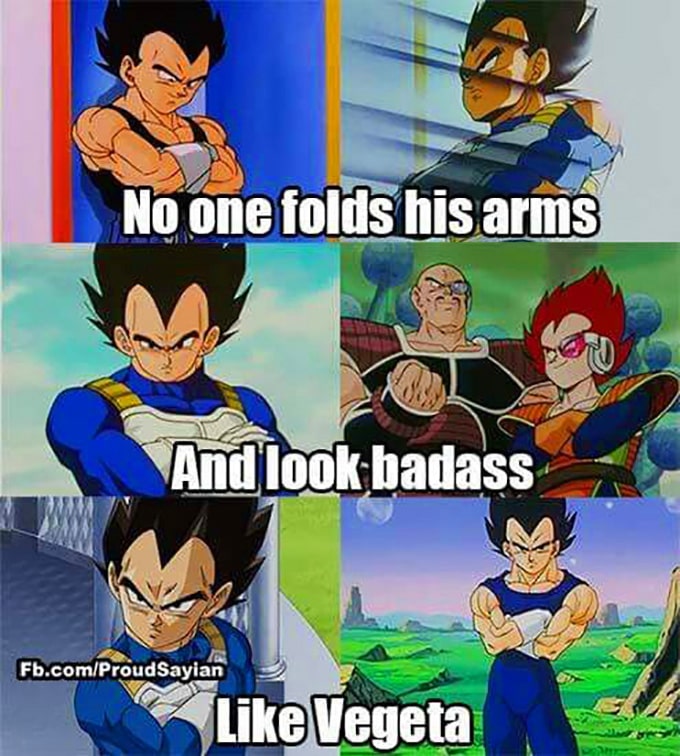
Why is pride so powerful? According to Alec Beall, a UBC psychology graduate student and co-author of the above study, the pride expression accentuates masculine physical features, such as upper body size and muscularity. Beall says, “Previous research has shown that these features are among the most attractive male physical characteristics, as judged by women.”
Furthermore, according to a 2014 study, “Pride displays function to signal high status, which benefits displayers by according them deference from others, and benefits observers by affording them valuable information about social-learning opportunities.”
Pride is a status symbol, and we look to proud people as potential leaders and teachers.
How can we understand the appeal of pride?
In my own analytical theory and experience, women are attracted to pride because pride is a reflection of presumed accomplishments, and accomplishments are a potential reflection of the ability to provide for and protect a mate and a potential family. Great accomplishments suggest prior aggressiveness, boldness, confidence, commitment, dominance, experience, and potential future success. Women then look for signs of these traits in a mate via their behavior and demeanor, ala pride. Thus, the greater the pride exhibited, the greater the attraction felt.
In contrast, a “nice guy” lacks these traits, will be walked over, and will be unable to protect a mate or provide for them. ‘No money? No power? No confidence? No thank you.’
When it comes to attraction, pride rules.
Vegeta’s Pride versus Goku’s Happiness
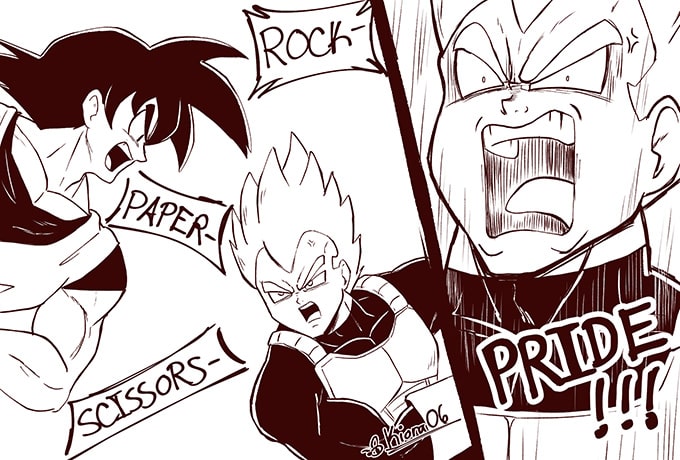
This study focused on heterosexual attraction in North America. Professor Jessica Tracy of UBC’s Department of Psychology says, “Generally, the results appear to reflect some very traditional gender norms and cultural values that have emerged, developed, and been reinforced through history, at least in Western cultures.”
Does it hold true in other countries?
Possibly. According to a 2008 study, “the nonverbal expression of pride generalizes across cultures” for males and females, and may be a universal human trait that everyone can exhibit and recognize.
So in theory, Vegeta should be the most attractive character to Dragon Ball fans in every country of the world. But that might not be the case.
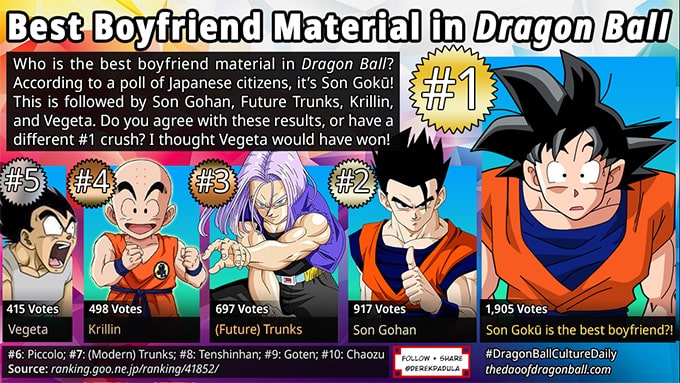
In a 2014 online poll of thousands of Japanese citizens, Goku was rated as “number 1 boyfriend material.” Vegeta was ranked #5!
Goku received 1,905 votes, while Vegeta received 415 votes. That’s 4.59 times as many votes for Goku.
This preference for Goku was affirmed in a 2017 poll of 100 unmarried Japanese women in their teens to 40s, where Goku was again rated number 1, although this time Vegeta was ranked number 2.
If pride is so important, then how could Goku win in this category compared to Vegeta? This was a conversation starter on my Twitter, with many fans unable to accept the results.
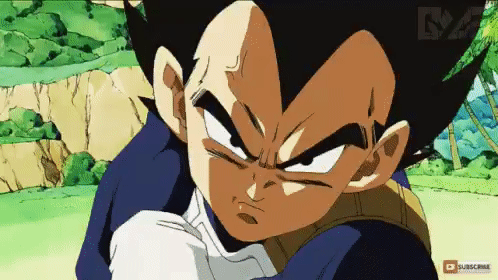
Does Goku being chosen as better boyfriend material in Japan have to do with different opinions and perspectives on what makes someone attractive? Perhaps different sociological worldviews between East and West?
Maybe in Japan, ‘the land of cute,’ women are more attracted to men who smile and are lighthearted, while in America the opposite is true? Or maybe they relate more to Goku, given his traditional East Asian cultural origin compared to Vegeta’s.
Alas, attractiveness and relationship material might be like comparing apples and oranges.
More studies on the DBZ fandom’s preferences need to be conducted, but perhaps we can surmise that immediate carnal attraction may go toward Vegeta, while a long-lasting relationship may go toward Goku.
While we wait for those studies, let me break down why most fans find Vegeta more attractive than Goku.
Vegeta’s Hot Body

Is pride enough to be sexy? I bet if Vegeta looked like Guldo and smelled like Bacterian, that fans wouldn’t be attracted to him. Vegeta’s body is a major factor behind why fans feel he’s so sexy.
But what’s interesting here is that he has a few areas that would work against a normal man.
Starting at the top, Vegeta is not cut from the ‘Johnny Bravo’ cloth of handsome characters or fashion models, instead sporting a questionable hairline and widow’s peak. It’s so distinctive that it forms the most signature part of his appearance.
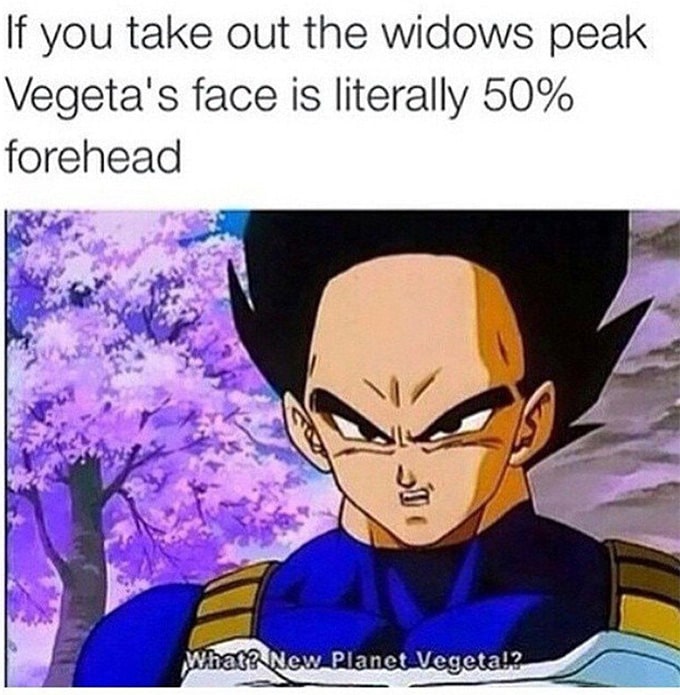
But that doesn’t bother fans much. In fact, when the rest of him is taken into account, it adds to his appeal.
Vegeta’s official height in the Dragon Ball Super Exciting Guide: Character Volume (2009) states he is 164 cm (5’3.8”) tall.
According to a UK poll by YouGov, most women prefer men who are 5’11”, and to be at least 3” taller than they are. But as the series progresses, the way Vegeta is drawn makes him look taller, getting closer to Goku’s 175 cm (5’7.5”). And his tall hair helps split the difference.
Shouldn’t Vegeta’s height work against his attractiveness?
To find out I posted a poll on Twitter asking, “Would you date a man who is 5’4” (164 cm) tall?”
Would you date a man who is 5’4” (164 cm) tall?
— Derek Padula (@derekpadula) July 26, 2022
49.1% of the 57 respondents said that they would date a man of this height, 36.8% said no, and 14% said yes on certain conditions.
I phrased the question in a way so that wouldn’t be asking about Vegeta, but given that most of my followers are Dragon Ball fans, some of them figured it out.
Vegeta fangirl Ashe replied to the poll: “Don’t care much about a guy’s height beyond if it’s a health concern. If I did I wouldn’t simp for this man with a forehead too big for his tiny body.”
So Vegeta being short doesn’t make him less attractive for 63.1% of fans. It’s either a non-issue or makes his personality all the sexier.
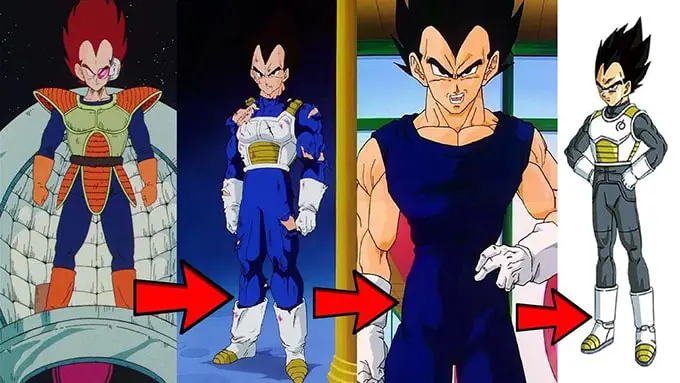
Vegeta’s changing body, image by JaxBlade
His muscles and athleticism during his first appearance are solid, but not outstanding. Given his height, he likely weighs about 55 kg (120 pounds).
Vegeta’s average—albeit athletic—body doesn’t add much to his attractiveness at the start. Especially when compared to the giant Nappa, who towers over him.
Yet as the art style of the series develops and sharpens, and his training intensifies, Vegeta’s definition and muscle mass reach the point where he likely weighs 73 kg (160 pounds).
Then he comes back down to a mid-point where he arguably has the most well-balanced body in anime. Later in Super he gets more lean, in accordance with Akira Toriyama’s changing art style.
It’s around this mid-point where Vegeta becomes a sex symbol for his physique alone. His muscular neck, large arms, hard pecs, chiseled abs, wide back, and thick thighs turn him into a sexual object for women and an ideal for men to strive for.
As a result of this gradual transformation, Vegeta’s fans retroactively redraw or reimagine Vegeta’s physique from earlier appearances with his peak physique in mind. The rounder art style during his origin is replaced with a more muscular and defined appearance. He takes on the best of what makes him sexy, prior to becoming so desirable.
Ultimately, Vegeta’s entire image, from beginning to end, takes on the veneer of sexiness, so that you cannot look at his earlier appearance without thinking of his later appearance.
His voice is another contributing factor to his physical sex appeal. Vegeta is played by Ryō Horikawa in Japan, Christopher Sabat in English (originally Brian Drummond), Éric Legrand in French, and René Garcia in Latin American Spanish, plus many others around the world. Each actor portrays Vegeta in a gravelly, disgruntled, aggressive, passionate, and short-tempered yet justified manner.
Yet when I asked the voice actors why they felt Vegeta was attractive, none of them had an answer. Only René replied:
Hi !! I Don’t have a clue 😅 As a character he is really in connection with so many human emotions. But the sex symbol thing 🤷🏻
— Rene Garcia (@renegarcia900) July 21, 2022
Seems the fans know Vegeta best.
In any case, all these factors combine with his dark hair, dark eyes, and physique to form a muscular mass of sex appeal.
Vegeta’s Hot Mind
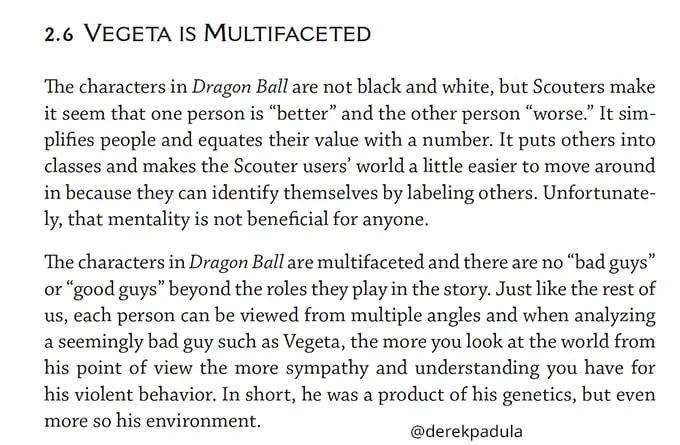
Excerpt from Dragon Ball Z “It’s Over 9,000!” When Worldviews Collide
A hot body isn’t enough. Many Dragon Ball fans feel that it is Vegeta’s complex mind that makes him so attractive. He has depth. He changes over time.
I asked Dragon Ball fans on my social media why they found Vegeta attractive.
Rena said, “His evolution and growth as a man and prince is something that makes him charismatic and attractive. He experiences changes his whole life, and had to survive and adapt constantly before he could have a life he chose, with people he truly cared about.”
Lorena felt it was Vegeta’s mysterious side that pulled her in. “In the series or manga it is not explored much, but I think he must be very complex about his actions and feelings. We all see him as serious and making [angry] faces, but we don’t know what he thinks. I love him❤”
Vegeta does not speak much because he lets his actions speak for him. He endures incredible pain, yet never gives up. He continues to persevere through hardships.
Molly wrote, “He’s complicated; he’s capable of genocide at the same time that he’s capable of being a loving husband or partner. … He lacks the morality and idealism of the other Z-Fighters and does bad things for good reasons. … He has a separate code of ethics and honor that’s apart from what society finds normal or acceptable. He has a redemption arc.”
Vegeta having his own ideals and being outside of the main group allows him to be freer and act on his own instincts. He didn’t grow up under a martial arts master who taught him how to restrain his urges and behaviors. And he never bumped his head and forget his Saiyan worldview. He acts according to his own free will. This lends to his bold nature, and in-turn to his attractiveness.
Being proud, strong, and silent combines with his sexy physique to get your motor running.
Attraction of Vegeta and Bulma
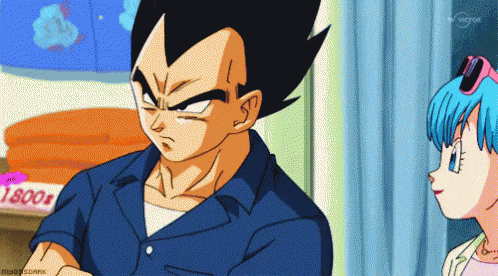
Adding to Vegeta’s allure is the romantic ideal of taming this wild stallion. Vegeta’s combined sex appeal was enough for Bulma to leave Yamcha for him, despite Vegeta once trying to kill her lifelong friends.
Why? Molly told me, “He’s the bad boy, the one we all think we can change. … We’re drawn to his personality: he’s arrogant, aggressive, intelligent, charismatic, boisterous, and dominant.”
Like any good romance novel where the female lead falls for the bravado of a dangerous man—only to transform him into a loving husband and father—the woman gets “the excitement of the bad boy and the security of a good man.” Just imagine: a beautiful, genius, and rich heiress conquering the heart of a noble, proud, and hard-shelled alien warrior!
The dynamic push and pull of Vegeta and Bulma’s personalities and beautiful bodies is at the heart of their relationship. Of wanting to be free yet tamed, and wild yet conquered. As strong, independent types, they don’t need each other, but when it comes to attraction, they do.
It works both ways. Vegeta explains in Dragon Ball Super that, “Saiyan men prefer strong-willed women.” So what’s good for the goose is good for the gander.
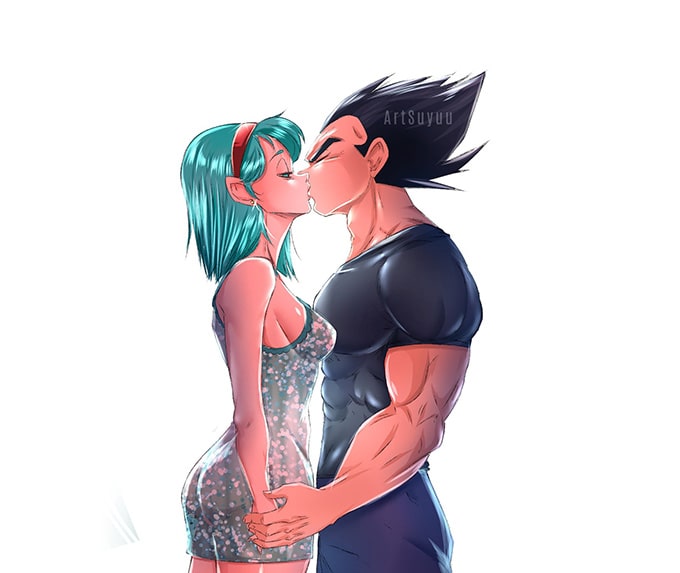
Their off-screen romance has inspired countless fan-fiction and fan-manga. Search online for #VegeBul to see the steamy results.
Vegeta and Bulma’s romance has even been the source of parody in other mainstream anime, such as Gintama (2006).
Who remembers the time Gintama roasted the shit out of Vegeta. pic.twitter.com/cwAsFluiab
— EpicLinkSam (@EpicLinkSam) August 6, 2022
Here we see the Gintama cast discussing whether Vegeta is good boyfriend material or a bad boy.
Bad Boy Vegeta
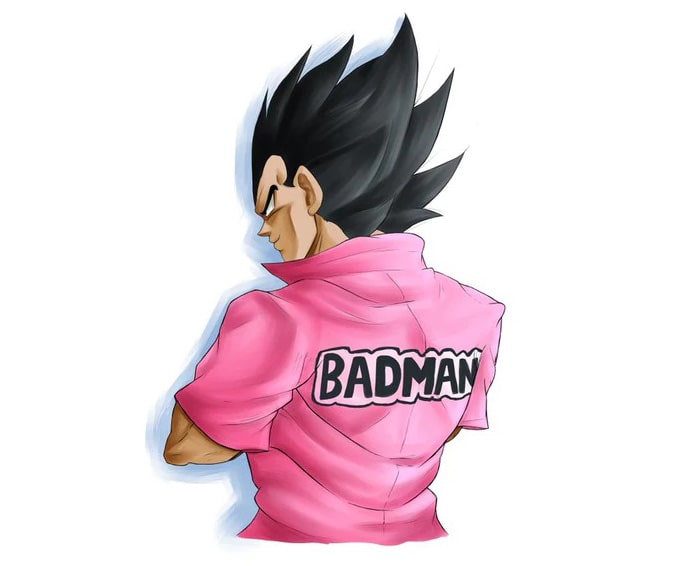
Personality-wise, when Vegeta first appears he is a narcissist, a murderer, is short-tempered, judgmental, doesn’t work well with others, claims to be the strongest man in the universe (despite knowing that Freeza and his men are stronger), eats bug people, and has severe psychological baggage. Truly, a “BADMAN”.
On paper this would not make for an attractive man, so why do some women seem capable of looking past these traits?
In Reporter magazine’s article the Sexualization of Psychopaths, Nickesia Gordon, a media studies professor at the Rochester Institute of Technology, argues that in our gender stereotyped society, “We have all these characteristics of acceptable masculinity where aggression in males is seen as being normal and natural. Being dominant is seen as desirable.”
Villainous male characters in films and TV shows are often shown as bold, aggressive, and dominant. Even when they harm others or harm the women they love, they are later shown as intelligent and sympathetic characters who women can relate to and feel that they are able to change.
Gordon says, “There is a stereotype that women are the better half. It is our duty to bring out the best in our men. Men are told to get married to become better people, and their wives are supposed to soften them and smooth out those rough edges.” It could be argued that this is what happens to Vegeta when he cohabitates with Bulma.
This is the crux of Vegeta’s motivation when he chooses to return to his roots and regain his strength. Yet some women find him the most attractive at the point when he is the most murderous.
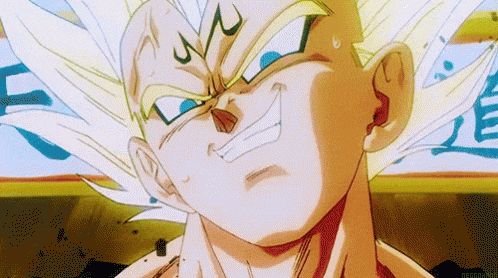
In other words, it’s okay for men in the stories we consume to be violent if they’re also attractive. In fact, due to the halo effect, people are more likely to attribute positive qualities to a person who has a beautiful body, and they will be more attracted to them regardless of their personality flaws. Vegeta can murder countless people, but because he’s good looking and confident, we forgive his behavior or look for excuses in the circumstances.
Author Leo Tolstoy said, “It is amazing how complete is the delusion that beauty is goodness.” Never mind that real-life villains are rarely good looking, our brains tell their own story about beautiful people’s bad behaviors. Vegeta doesn’t need to be nice, because in our minds he has become the protagonist.
For some fans, this is what makes him attractive in the first place. Taylor said:
“Apparently I loved his toxicity, since I was down for him since the Saiyan Saga. Them red flags just be drawing you in.”
One female Redditor put it like this: “I think Goku is cute, but Vegeta is sexy. Like, Goku is the nice one, so he has that cute guy element about him, but Vegeta is a bad boy who struggles to love, and I don’t care how corny that sounds, I think it’s hot.”
There are also cases where the woman believes her mate’s violence against others is justified, so long as it’s used to protect her. Still others want to be conquered and dominated by their man, thus justifying their aggressiveness.
Oftentimes, the woman has the hopes of changing her man, yet not wanting to lose what made them attractive in the first place. They see him as someone they can fix. That he’s just misunderstood. And that if they find a way to change his less desirable behavior, then he’ll be the perfect man.
Such a belief usually doesn’t work out too well. Many women have told me their stories of falling in love with a bad boy, only to be hurt by them.
This brings us back to the study: Why do women prefer moody and ashamed men over happy men? Do women not want men to be happy?
It turns out that women who prefer proud men also feel that men who are moody and ashamed are capable of showing guilt and remorse, which means they understand social norms and can change their behavior. In other words, the woman can fix the man.
To extrapolate further, I’d say that happy men don’t need a woman to fix them. They are neither proud—and therefore attractive, nor broken—and therefore attractive. So most women are not interested in happy men.
Obviously the results of this study paint a broad stroke that don’t apply to every woman. I’d like to imagine that some women do want their man to be happy. Because if they don’t, then what are happy men to do? Should they hide their happiness and pretend to be proud or moody to get female attention? Are they doomed to be forever alone so long as they remain happy? And if they get a girl, but then show their happiness, will the attraction fade and cause them to lose the girl? Seems twisted!
Nonetheless, Vegeta personifies what most women want without even trying. He’s sexy by being himself.
Hence, the allure of the “bad boy.” Dragon Ball is no exception to this allure because it’s a story told in an illustrated medium, and Vegeta proves it.
Sandra wrote, “Sexy body, handsome face, and his attitude. Overall: He’s so sexy.”
Nadia seconded this with, “Sexy, royal, bad boy.”
Of course, his actions aren’t all bad. As the series goes on, Vegeta’s actions go from selfish to selfless, and he sacrifices himself to help others. For example, in Dragon Ball Z: Wrath of the Dragon (1995), Vegeta protects a building full of people from the monstrous Hildegarn’s flame breath by projecting an energy shield. Prior to passing out, he laments making such a ‘foolish’ choice, but he makes it nonetheless.

So maybe Vegeta really is a misunderstood good guy rather than a true bad boy? Malena said, “He is a bad boy with a good heart.”
Vegeta is such a complex character that we are left unable to decide if he is a good guy or bad guy. With a limited amount of exposure and information about this man at different points of the story, we excuse bad behavior and justify it on account of the good.
The more you learn about his troubled past, the more you appreciate his struggle to improve. We start to root for the bad guy. We admire him, want to be with him, and to be like him. Vegeta is a “sexy, complex, and gorgeous man” that we cheer for.
Non-Sexual Attractiveness
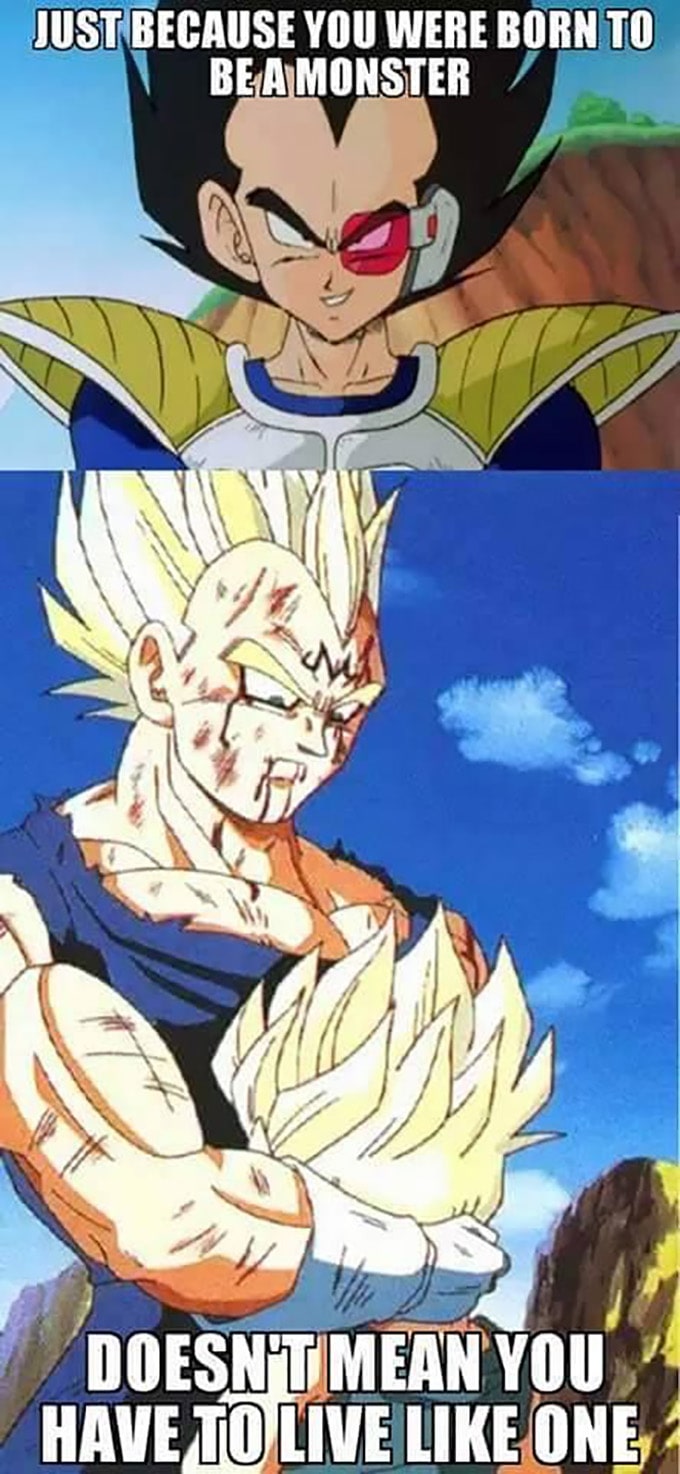
Vegeta is also attractive in a non-sexual way, and people often aspire to be more like him in real life. The 2014 study above concluded that human beings look to proud people as leaders and teachers. We are attracted to Vegeta because he teaches us how to be better.
His ego and pride are relatable to men and women who strive to be strong for themselves and their families. He is proficient in his area of expertise and gives 100% in battle, yet he can take care of his lover and children. He even sacrifices himself to protect them.
Vegeta is a tragic figure with shades of grey and moral complexity. Born a Saiyan prince, he’s soon orphaned at the hands of Freeza and then raised by this same murderer. Freeza is a genocidal maniac who teaches Vegeta to kill others and who then later tries to kill his subordinate when he gets too good at it. As a result, Vegeta lived a life of mental and physical abuse, and is filled with rage and insecurity about his future.
He grows up traumatized and unable to express his emotions, and perhaps views doing so as a weakness. But as he matures, he learns how to express himself through his actions. No one teaches him how to do this. His personal growth through sheer willpower allows him to transcend his upbringing, and go from a heartless warrior to a man who fights for what is most important to his heart.
When Vegeta meets Goku, his worldview is challenged and he’s defeated by a group of supposed weaklings. On top of this, he believed himself to be the best in the universe, but was knocked down and nearly killed by someone he felt was inferior. His worldview was shattered, yet he picked himself up, recovered, and trained ever-harder until he rose anew. Vegeta represents the opportunity of a second chance, and the will to keep trying.
Their encounter puts him on a path of redemption, loss, and personal transformation. Although it appears that Bulma softened his rough edges, Vegeta’s transformation began after fighting Goku for the first time. He then embarked on his long journey of mental and literal transformation, which was aided by Bulma and others. His innate curiosity and desire to learn is what fueled his growth.
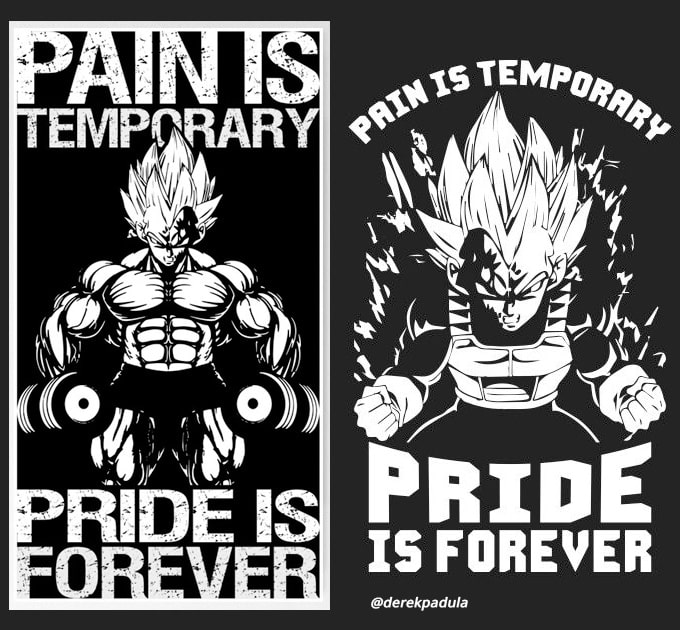
Vegeta’s an honest man. Once he thought he was back on top, again and again he was eclipsed by someone else. He then realized and acknowledged he was still second-best to Goku. A normal man would have given up and blamed others or their circumstances, but not Vegeta. He first had to be honest with himself, and then have the integrity to be honest with others. He continued training and improving himself, no matter how difficult the situation.
Vegeta doesn’t make excuses. He doesn’t rationalize decisions that would lead to failure. He doesn’t squander his time. Instead, he makes the necessary changes and does the work needed to achieve his goals. In this way he earns the respect of fans and is a role-model for every fan to become their best self.
There are even fans in the LGBTQ+ community who have used Vegeta’s pride as a symbol of their pride.
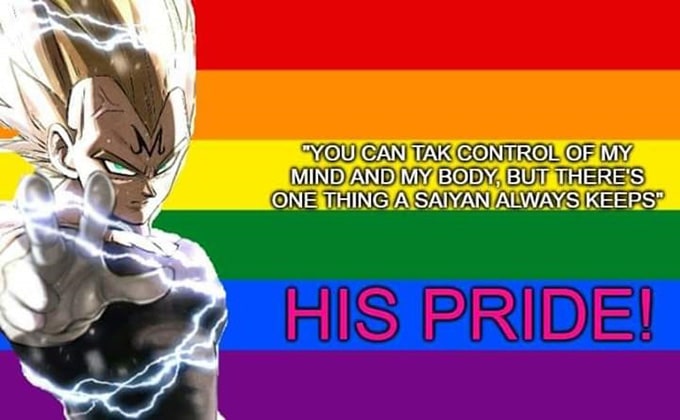
Fans see themselves in Vegeta. His intense struggles often result in frustration, or short-term happiness followed by a feeling of failure. We as fans get to see Vegeta’s most tender moments, when he fails, and cries, and then picks himself back up. Only to once again push that Sisyphus’s boulder up the cliff, and in so doing find a glimpse of joy in the labor.
This is one of the many reasons athletes use Vegeta as a role model. He represents the constant toil of breaking down the body and building it back up that results in a visual transformation led by an iron will.
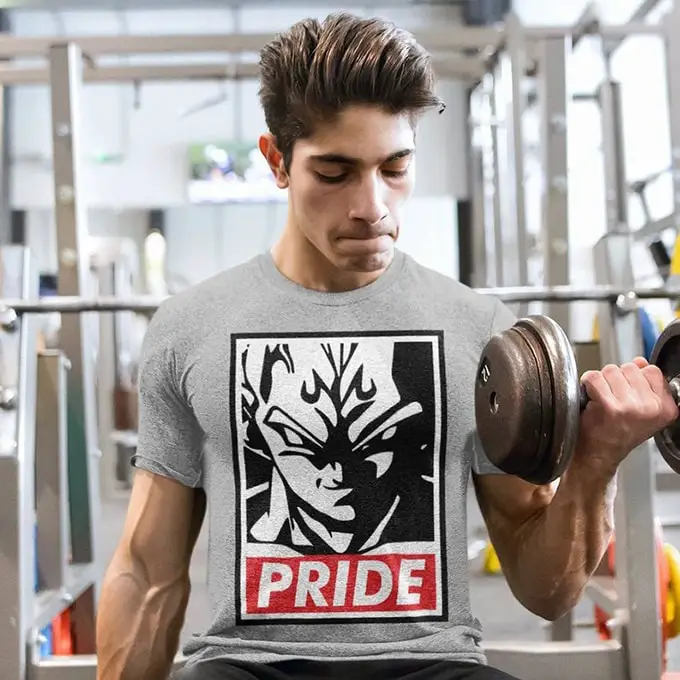
After decades of watching his life unfold, we think we know Vegeta, yet his behavior remains mysterious. As a result of how we perceive Vegeta as a stoic bad boy, whenever we see him act goofy and break this image, we find him even more charming. His deference to gods and others around him in Dragon Ball Super—as a temporary sacrifice of his ego to protect his family—makes him more endearing, and serves as an even greater display of his integrity and pride. He lets go of himself for the sake of others, and we love him for it.
Ultimately, Vegeta turns into a definitive anti-hero who is forced to lose in order to gain. He swallows his pride in order to let go of his inner demons. By doing so he finds a woman who loves him, gains a family, and the attraction of fans around the world. In time, he helps save the planet, the galaxy, and eventually the entire universe.
Now that’s something to be proud of!
Vegeta’s Pride is Attractive
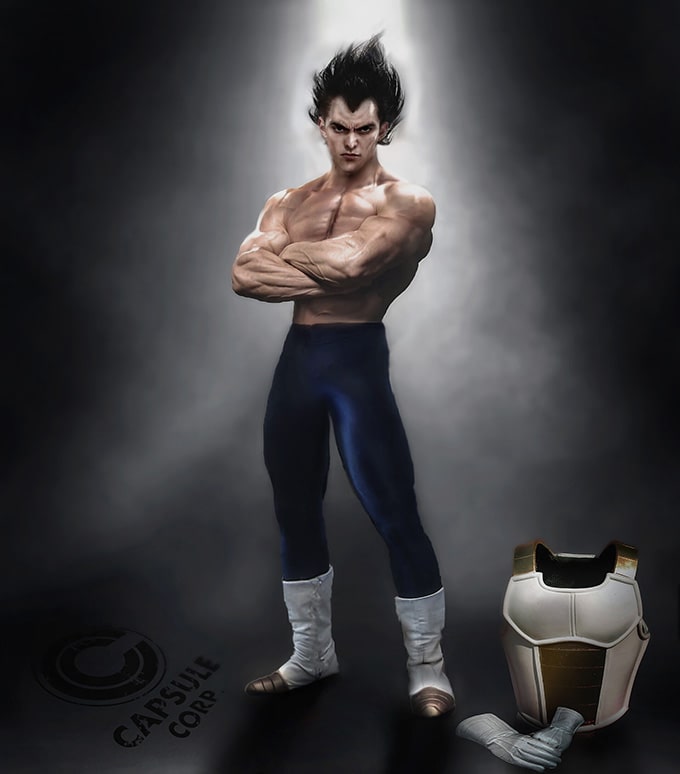
Vegeta’s combination of pride, honesty, drive, and that body makes him a heartthrob to millions. Despite being an alien and immigrant to Earth, it’s his humanness that makes him relatable. His constant struggle to rise higher and achieve his own brand of happiness makes him attractive to us all.
Why do you think Vegeta’s pride is attractive? Do you agree with my analysis? Add your thoughts in the comments!
To learn more about Vegeta and Goku’s psychology, childhoods, father figures, and what makes them the greatest rivals in anime history, please read Dragon Ball Z “It’s Over 9,000!” When Worldviews Collide. It features a foreword by the Japanese voice of Vegeta, Ryō Horikawa, and an exclusive interview with Brian Drummond, who coined the phrase “It’s Over 9,000!”
Resources
PubMed: Happy Guys Finish Last: the impact of emotion expressions on sexual attraction (2011)
PubMed: The nonverbal expression of pride: evidence for cross-cultural recognition: (2008)
University of British Columbia; Happy Guys Finish Last
University of British Columbia: Images used in the 2011 study
' . $comment->comment_content . '
'; } } else { echo 'No comments found.'; }